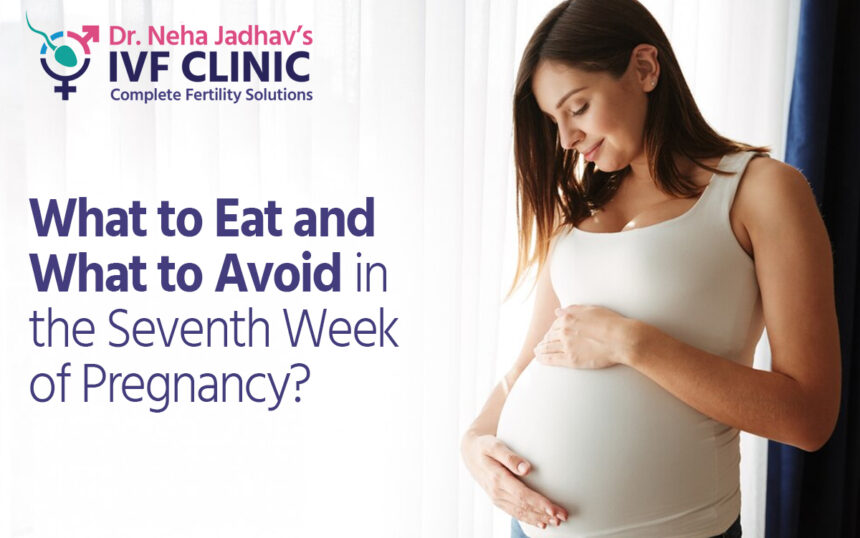
What to Eat and What to Avoid in the Seventh Week of Pregnancy?
Pregnancy is a beautiful yet challenging time, especially during the early weeks when the body undergoes significant changes. By the seventh week, the baby’s development is progressing rapidly, and the mother’s body is adjusting to the demands of pregnancy. Nutrition plays a key role during this period, as the food you eat directly impacts both your health and the health of your growing baby.
In this article, we’ll discuss what to eat and what to avoid during the seventh week of pregnancy to ensure a healthy pregnancy journey.
What to Eat in the Seventh Week of Pregnancy?
- Folic Acid-Rich Foods
Folic acid is essential during early pregnancy, especially in the seventh week, as it helps prevent neural tube defects and supports the development of the baby’s brain and spinal cord. Foods rich in folic acid include leafy greens like spinach and kale, broccoli, beans, lentils, citrus fruits, and fortified cereals. - Protein-Rich Foods
Protein is crucial for the growth and development of your baby’s cells and tissues. Good sources of protein include lean meats like chicken and turkey, fish (ensure it’s low in mercury), eggs, beans, tofu, and dairy products like milk and yogurt. - Whole Grains
Whole grains provide much-needed energy and are a good source of fiber, which helps with digestion and can prevent constipation, a common issue in pregnancy. Include whole grains like oats, brown rice, whole wheat bread, and quinoa in your meals. - Calcium-Rich Foods
Calcium is important for the development of your baby’s bones and teeth. Dairy products such as milk, cheese, and yogurt are excellent sources of calcium. Non-dairy sources include fortified plant-based milk (almond, soy), leafy greens, and almonds. - Healthy Fats
Healthy fats support your baby’s brain development and help with the absorption of vitamins. Include sources of unsaturated fats such as avocados, nuts, seeds, olive oil, and fatty fish like salmon. - Hydrating Foods
Staying hydrated is essential during pregnancy, especially as the body undergoes various hormonal changes. Drink plenty of water throughout the day, and consume hydrating foods such as cucumbers, watermelon, oranges, and soups to maintain hydration. - Iron-Rich Foods
Iron is important to prevent anemia during pregnancy, which can cause fatigue and other health issues. Good sources of iron include lean meats, spinach, legumes, lentils, and fortified cereals. Pair iron-rich foods with vitamin C-rich foods like oranges, tomatoes, and bell peppers to enhance absorption.
What to Avoid in the Seventh Week of Pregnancy?
- Raw or Undercooked Foods
Avoid consuming raw or undercooked meat, fish, eggs, or poultry, as these can contain harmful bacteria and parasites that may lead to infections, such as salmonella or listeria, which can be dangerous for both you and your baby. Ensure all meats are fully cooked and eggs are well-done. - Unpasteurized Dairy Products
Unpasteurized dairy products, such as certain cheeses, may contain harmful bacteria like Listeria. Always choose pasteurized versions of dairy products to reduce the risk of foodborne illnesses. - Caffeine
While a small amount of caffeine is generally considered safe during pregnancy, excessive caffeine intake can increase the risk of miscarriage, low birth weight, and preterm birth. It’s best to limit your caffeine intake to 200-300 mg per day, which is roughly the amount in one cup of coffee. Remember that caffeine is also found in tea, chocolate, and some soft drinks. - Alcohol
Alcohol consumption during pregnancy is highly discouraged as it can lead to fetal alcohol syndrome (FAS) and other developmental issues for the baby. It’s safest to avoid alcohol completely during pregnancy to protect your baby’s health. - Certain Fish with High Mercury Levels
While fish is a good source of healthy fats, some fish contain high levels of mercury, which can harm your baby’s developing nervous system. Avoid fish like swordfish, shark, king mackerel, and tilefish. Opt for low-mercury fish such as salmon, sardines, and trout instead. - High-Mercury Fish
As mentioned, fish like swordfish, shark, and king mackerel should be avoided during pregnancy. These fish have high mercury levels, which can affect your baby’s brain development. Stick to safer options like salmon, shrimp, and canned light tuna. - Junk and Processed Foods
While it’s tempting to indulge in junk and processed foods, it’s best to avoid them as much as possible. These foods are often high in unhealthy fats, sugar, and salt, which can contribute to excessive weight gain, gestational diabetes, and other complications during pregnancy.
Conclusion
The seventh week of pregnancy is a crucial time for both the mother and the baby. A balanced, nutrient-rich diet that includes folic acid, protein, calcium, iron, and healthy fats is essential for the baby’s growth and development. At the same time, it’s important to avoid certain foods that could pose risks to the baby’s health, such as raw meats, unpasteurized dairy, and high-mercury fish.
By making informed food choices and prioritizing a healthy, balanced diet, you can help ensure a smooth and healthy pregnancy. Always consult with your healthcare provider or nutritionist to tailor your diet to your specific needs and ensure you’re on the right track for a healthy pregnancy.
